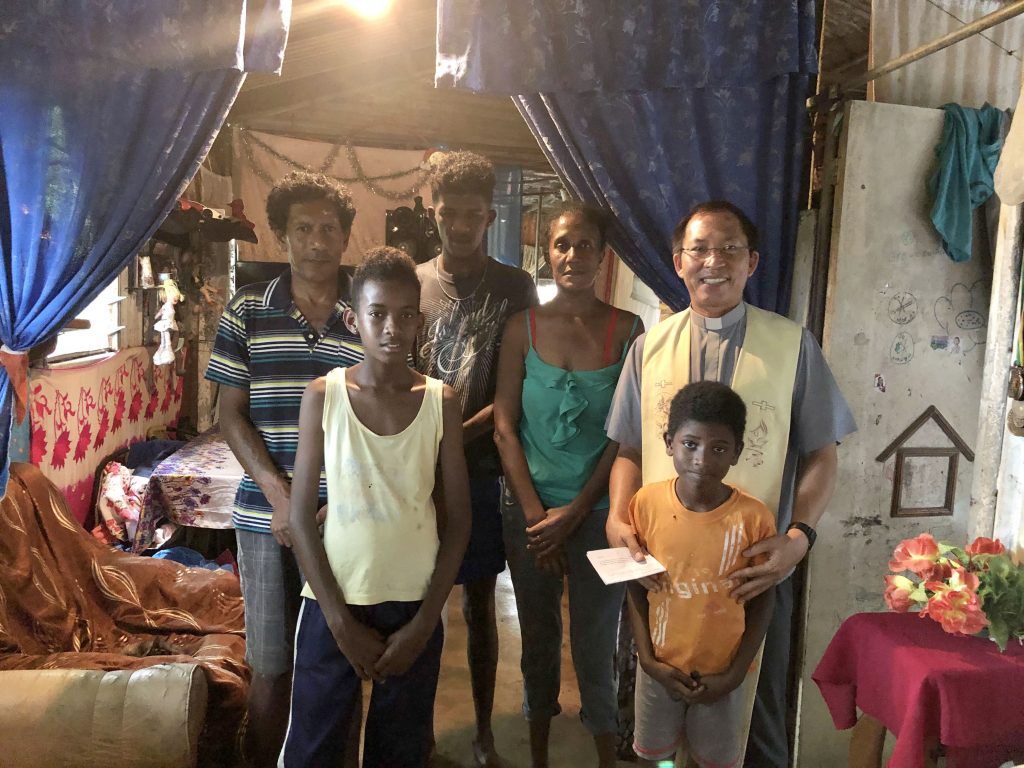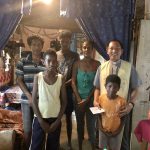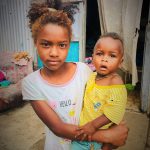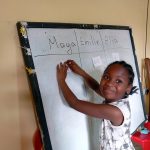Aventures missionaire – Mauritius
‘I give back to the Lord what he has given me’
Publié le 13/06/2023

Le père Joseph Nguyen Van Viet rend visite à une famille à Saint-Henri, un village de la paroisse de Notre-Dame-des-Anges-Mahébourg.
It will soon be thirty-seven years that I have been on pilgrimage in Mauritius. As Pope Francis pointed out during his visit to the island in 2019, the culture of encounter and migration are in our DNA. Here, on this little thousand-faceted jewel, you feel you are travelling all the time, as there are so many cultures and religions present. It is easy to be seduced by the people, the landscapes, the beaches, not to mention the incredibly diverse cuisine. After completing my studies, I embarked on a career in journalism, before finding myself working for the Port-Louis diocese. For nearly ten years I have been working in communications with diocesan organisations such as the audio-visual department, young people and vocations. It’s a way for me to give back to the Lord what he has given to me. Working in the parish of Sainte-Thérèse in Curepipe, in the centre of the country, I help, as best I can, to provide liturgical support and to accompany the youth. It’s a job that has led me to meet young MEP volunteers who have been in the parish for almost a year. I am amazed by the enthusiasm of the volunteers. My absolute favourite is the breakfast served Mondays to Fridays to children in the Joachim district and the surrounding area. As I described in one of my articles, in the past I had to open an MEP Review to follow the activities of missions abroad. Today, the mission is taking place in my own country. This confirms that the Lord takes his time and that Mauritius remains a land of missions. Half of the local clergy, numbering about a hundred priests, is made up of missionaries from abroad.
Young people: the primary mission
Behind the pretty postcard image that Mauritius may project, the reality, as in all societies, is more nuanced. It hasn’t helped the island, which has been independent for 55 years, to be so far from anywhere. It has still been experiencing, sometimes more harshly than other locations, the effects of the crises that have been shaking the world: rising cost of living, increasing gap between rich and poor, unemployment, the struggle against corruption. The list goes on, the challenges are legion. In addition to all of this there are the effects of climate change, which are undermining the country’s principal assets, including the environment, among others. In barely 50 years, the country’s economy has shifted from being based primarily on agriculture and textiles to a model resolutely focused on services. Despite these high-speed changes, typified these days by the arrival of the Light Railway, poverty is still present. The primary victims of this sad reality are the young. Many of them are unemployed, and often illiterate, too. Rejected by the traditional school system, young people are often condemned to an uncertain future. The most vulnerable often find themselves trapped in the illegal drugs trade.
Another challenge is the increase of young people in the prison population. And, in their aspiration for a more stable life, many young Mauritians are leaving the country.
Fighting academic failure
The Catholic Church, which has been present in the country for three hundred years, has been fighting tirelessly against poverty, and to offer better prospects to younger generations. The Church has more than fifty schools that are open to all Mauritians, regardless of their social situation or religion. The diocese of Port-Louis is one of the main partners of the Mauritian State as regards education, but also for the eradication of poverty. To counter school failure, early learning centres for toddlers have been created in several parishes. In addition, the Bishop of Port-Louis, Cardinal Maurice E. Piat, places greatemphasis on the technical and professional sectors as a route for those who do not fit into the academic system. The encouragement of Pope Francis, in 2019, to make young people ‘our primary mission’ has strengthened the Church in its mission with the youngergeneration.
The 2021-2023 Synod: Church priorities, welcome and young people
The Church, like Mauritian society, is also experiencing many changes. The number of priests is decreasing. Lay people are increasingly asked to support the clergy. The Church here is already, before its time, experiencing the synod: communion, participation and mission. New pastoral approaches are also topical to reach young people where they are. With modern life and the imperatives of the world of work, young people have less time to get involved and they feel the need to give meaning to their lives. It is in this context that Alpha Youth or Group 40 courses are regularly offered. These are courses introducing Christianity to young people aged between 18 and 25.
Mauritius: an interfaith and multicultural laboratory
I have a great interest in ecumenical and interfaith dialogue. In a country such as mine, where the descendants of Europeans, Asians and Africans rub shoulders, the ability to build bridges is a great asset and is, in fact, essential. The challenge is to maintain peace and social harmony. The fundamental conditions for this are good representation of the different groups and faiths as well as the elimination of all forms of discrimination. This is what the Vatican’s number two, Pietro Parolin, said when speaking during the apostolic visit of Pope Francis in 2019. The Church plays an active role in this culture of encounter with its involvement in the Council of Religions. This movement was born in the wake of the troubles that marked our young country. History is unfortunately full of episodes of clashes between ethnic and religious communities. The CoR is working tirelessly so that history does not repeat itself, so that there is no explosion in this open-air laboratory. Its latest initiative is the launch of the youth wing of the Council of Religions. Here too, the ‘Walking together’ encouraged by Pope Francis is a path to be followed. It is not enough to be next to each other to live together, it is also a question of moving forward together by accepting our differences. These are things that are close to my heart and that I often mention in the interviews I give on television or in the columns of newspapers.
This is my journey and that of my country. To quote one of the songs of the late Henri Salvador, I would be tempted to say: ‘In my island… Ah! You feel so good!’ Like watchmen, we must remain vigilant and act to preserve this little piece of heaven on earth.
Rodney Coco, journalist, communications officer for the Diocese of Port-Louis
- Le père Joseph Nguyen Van Viet rend visite à une famille à Saint-Henri, un village de la paroisse de Notre-Dame-des-Anges-Mahébourg.
- Enfants du village de Saint-Hilaire, un village de la paroisse de Notre-Dame-des-Anges-Mahébourg.
- Jeunesse mauricienne.


